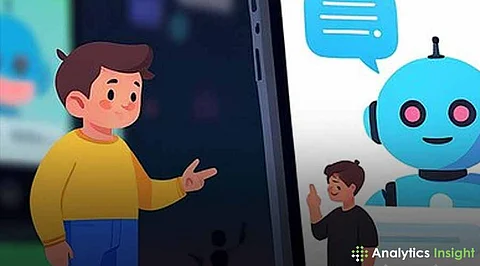

Free Phone Calls with ChatGPT: Traditional methods like phone calls and messaging are evolving with the rise of AI technologies. Among these advancements, AI-driven communication through platforms like ChatGPT stands out. Imagine making free phone calls using AI. This isn’t a distant dream. It’s becoming a reality.
AI-driven communication utilizes artificial intelligence to enhance the way we interact. It can include chatbots, automated emails, or even voice calls. With the power of AI, these interactions become more natural, intuitive, and efficient. AI understands human language better than ever before. It can respond in real time, offer suggestions, and even predict your needs.
ChatGPT, developed by OpenAI, is one of the most advanced conversational models. Initially, it started as a text-based tool. Now, it's expanding into voice-based interactions. This means ChatGPT can now talk, listen, and understand voice inputs, mimicking human-like conversations.
The next step? Offering free phone calls. How? By using the same AI engine that powers text conversations but applies it to voice calls. This can revolutionize the way people communicate globally.
AI-driven phone calls leverage technologies like natural language processing (NLP) and text-to-speech (TTS). Here's a breakdown of how it works:
Voice Recognition: The AI-first captures your voice through the microphone.
Speech-to-Text Conversion: It converts your spoken words into text.
Processing and Understanding: The AI then processes this text, understands the context, and formulates a response.
Text to Speech: It converts its response back into voice, making the interaction seamless.
This process happens in milliseconds, making conversations feel fluid and natural.
To make AI-driven phone calls possible, several technologies work together:
Natural Language Processing (NLP): NLP allows AI to understand the meaning of spoken words. It helps the system comprehend accents, intonations, and even emotions.
Machine Learning Models: ChatGPT uses machine learning models to predict the next words in a conversation. This makes it sound human-like and engaging.
Speech-to-Text and Text-to-Speech: Advanced speech recognition converts your voice into text. TTS technology converts AI’s response back into a natural-sounding voice.
Cloud Computing: Powerful cloud servers ensure that these complex processes happen in real time, enabling smooth and uninterrupted communication.
AI-driven phone calls offer numerous benefits:
Cost-Effective: Traditional phone calls can be expensive, especially for international calls. AI-driven calls reduce costs to almost zero by using the internet.
Accessibility: People in remote areas can make calls easily without worrying about network coverage.
Personalization: AI can remember preferences, making conversations more personal and engaging.
Availability: The AI never sleeps. It can take calls 24/7, making it perfect for customer service and support.
Language Translation: AI can translate languages in real time, breaking down language barriers.
While AI-driven phone calls sound promising, they come with challenges:
Privacy Concerns: AI will handle sensitive data during conversations. Ensuring privacy and data security is crucial.
Quality of Interaction: AI needs to understand various accents, slang, and speech nuances. Poor quality could lead to frustration.
Legal and Ethical Issues: Regulations around recording and storing voice data vary across regions. Companies need to navigate these laws carefully.
AI-driven phone calls can change how businesses operate. Customer service becomes more efficient. Support teams can handle more calls with fewer resources. This also opens opportunities for small businesses that can't afford large call centers.
AI can handle repetitive inquiries, freeing up human agents to focus on complex issues. This blend of AI and human agents creates a more dynamic and responsive customer service experience.
One of the most exciting aspects of AI-driven phone calls is the potential for real-time language translation. Imagine talking to someone on the other side of the world, in a language you don’t speak, and still understanding each other perfectly.
ChatGPT can translate conversations in real time. This eliminates language barriers and promotes global connectivity. Businesses can expand into new markets without needing multilingual teams.
Beyond business, AI-driven phone calls offer great potential for personal use. You can talk to friends and family across the globe without worrying about costs. The AI can also be a personal assistant, scheduling calls, reminding you of appointments, and even helping with tasks like booking tickets or finding information.
AI-driven communication won’t stop at phone calls. Imagine your smart speaker making calls for you, or your car’s AI assistant arranging your meetings while you drive. Integration with IoT devices can make AI a part of your daily routine, streamlining tasks and enhancing productivity.
Smartphones, smart speakers, and even wearable devices will likely support AI-driven communication soon. This will create a seamless, interconnected communication ecosystem.
The future of AI-driven communication may lead to fully automated conversations. ChatGPT and similar models can act as intermediaries for communication between humans. For instance, an AI could manage customer service calls without any human intervention.
It can also help people with disabilities communicate more easily. Voice commands, real-time translations, and contextual understanding will make technology more inclusive and accessible.
AI-driven phone calls are just the beginning. As technology advances, the quality and capabilities of these systems will improve. Expect smoother conversations, better understanding, and even more human-like interactions.
AI may also start playing a role in detecting emotions, understanding sarcasm, or even generating personalized voices. The future will likely see more nuanced and natural conversations powered by AI.
The rise of AI-driven communication with tools like ChatGPT is reshaping our interactions. Free phone calls with AI might soon be commonplace. The benefits are clear, cost savings, better accessibility, and a global reach.
However, challenges like privacy, quality, and regulations need attention. As these hurdles get resolved, AI-driven communication will become more robust.
The future of AI-driven communication is promising. It offers endless possibilities for personal and business use. With continuous advancements, free phone calls with AI will become a norm, connecting people across the globe like never before.
